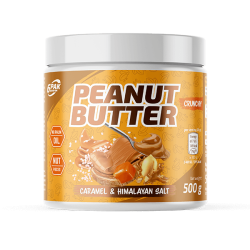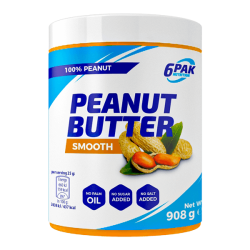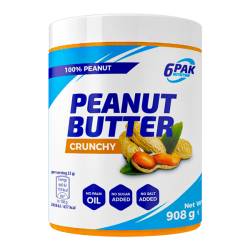Peanut Butter - Krem orzechowy z karmelem i solą himalajską
-
Kategorie
-
-
-
-
ODŻYWKI I SUPLEMENTY
-
-
-
-
ZDROWIE I WITAMINY
-
-
-
-
-
-
AKCESORIA
-
-
-
-
NASZE LINIE PRODUKTÓW
-
-
-
-
Masła orzechowe
Orzeszki ziemne – czym tak naprawdę są?
Orzeszki ziemne lub orzeszki arachidowe to tak naprawdę jadalne nasiona warzyw. Orzech ziemny (Arachis hypogaea) jest technicznie uważany za groch i należy do rodziny fasoli/roślin strączkowych. Chociaż to warzywo; jest ogólnie zaliczany do nasion oleistych ze względu na wysoką zawartość oleju. Orzeszki ziemne są bogate w białko, olej i błonnik. Oprócz oleju, orzeszki ziemne są szeroko stosowane do produkcji masła orzechowego, słodyczy, prażonych orzeszków ziemnych, przekąsek, ale też wypełniaczy w recepturach produktów mięsnych, zup i deserów. Na całym świecie istnieją tysiące odmian orzeszków ziemnych. Niektóre grupy odmian są preferowane do określonych zastosowań ze względu m. in. na różnice w smaku, zawartości oleju, wielkości, kształcie.
Od kiedy jemy orzeszki ziemne?
Od bardzo dawna! Historia orzeszków ziemnych sięga czasów starożytnych Inków z Peru. Jako pierwsi uprawiali dzikie orzeszki ziemne i ofiarowywali je Bogu słońca w ramach swoich obrzędów religijnych. Współczesna historia popularyzacji orzeszków ziemnych rozpoczęła się wraz z wojną domową lat 60. XIX wieku w Ameryce. A masło orzechowe zostało stworzone w latach 90. XIX wieku jako miękki substytut białka dla osób o słabych zębach. Początek komercjalizacji i popularyzacji masła orzechowego w Ameryce, które stopniowo rozprzestrzeniło się na cały świat Europy i Azji to pierwsza połowa XX wieku.
A skąd pochodzą orzeszki ziemne?
Obecnie w produkcji orzeszków ziemnych przodują Chiny – mają około 45% udziału w światowej produkcji. Indie są drugim co do wielkości producentem orzeszków ziemnych na świecie (16% udziału), a USA plasują się na trzecim miejscu (5% udziału).
Co zawierają orzeszki ziemne?
Białko, tłuszcze i błonnik to główne składniki, które składają się na orzeszki ziemne. Wszystkie te składniki występują w najbardziej korzystnych formach. Białko jest pochodzenia roślinnego; tłuszcz jest nienasycony, a błonnik to złożone węglowodany, które, jak udowodniono, są najlepsze w żywieniu człowieka. A jak to jest z tym białkiem w orzeszkach ziemnych? Otóż orzeszki ziemne są w rzeczywistości rośliną strączkową i zawierają więcej białka niż jakikolwiek inny orzech, a ich poziom jest porównywalny lub lepszy niż porcja fasoli. Arachidy zawierają wszystkie 20 aminokwasów w zmiennych proporcjach i są największym źródłem aminokwasu znanego jako arginina. Podsumowując, orzeszki ziemne są doskonałym źródłem białka (około 25% energii) i błonnika pokarmowego dostarczającego 5%–10% dziennego zapotrzebowania na błonnik w jednej porcji (30 g), z potencjalnymi korzyściami dla kontroli sytości. Inne bioaktywne składniki odżywcze zawarte w orzeszkach ziemnych to witamina E i polifenole, fitosterole i tłuszcze jednonienasycone (dostarczają do 80% składu kwasów tłuszczowych). W orzeszkach zmiennych znajdziemy też m. in. niacynę, kwas foliowy, tiaminę, kwas pantotenowy, witaminę B6 oraz miedź, mangan, żelazo, fosfor i magnez.
Spożywanie orzeszków ziemnych
Spożycie orzeszków ziemnych na całym świecie różni się w dużych proporcjach, stąd też produkty handlowe są zróżnicowane i generalnie zlokalizowane. Orzeszki ziemne zostały opracowane w różnych produktach, takich jak np. prażone orzeszki ziemne, masło orzechowe, olej arachidowy, pasta z orzeszków ziemnych, sos z orzeszków ziemnych, mąka z orzeszków ziemnych, mleko z orzeszków ziemnych, napój z orzeszków ziemnych, przekąski z orzeszków ziemnych (słone i słodkie batoniki). Surowe orzeszki ziemne są spożywane na całym świecie. A wiesz, że 50% spożycia orzeszków ziemnych w Stanach Zjednoczonych pochodzi z masła orzechowego? Warto wiedzieć, że dodatek skórki z orzeszków ziemnych do masła orzechowego ma też znaczenie – wpływa na zawartość błonnika, przeciwutleniaczy i całkowitą zawartość fenoli w przygotowanym produkcie.
Masło orzechowe czy krem orzechowy?
A może pasta orzechowa? Jaki produkt wybrać? Tak naprawdę wszystkie te określenia dotyczą tego samego produktu. Technologia produkcji jest taka sama. Wątpliwości dotyczą kwestii samego nazewnictwa tego wyrobu z orzechów. Dlaczego? Wszystko wynika z regulacji unijnych. W 2017 r. Trybunał Sprawiedliwości Unii Europejskiej zadecydował, że termin masło może odnosić się wyłącznie do przetworów mleka zwierzęcego (podobnie jak np. ser, śmietana czy jogurt). Dlatego też na opakowaniach smarowidła z orzechów nie znajdziesz hasła masło orzechowe.
Czy masło orzechowe ma jakieś właściwości? Jakie masło orzechowe wybrać?
Wybierając krem orzechowy warto zwrócić uwagę, aby w składzie nie było dodanych np. uwodornionych olejów roślinnych, których celem jest przedłużenie trwałości gotowego wyrobu i zapobiegnięcie rozwarstwianiu się. Ale prawda jest taka, że rozwarstwienie jest naturalnym efektem i nie wpływa na jakość produktu – to wytrąca się olej z orzechów. Przed spożyciem wystarczy tylko produkt wymieszać i gotowe! Na rynku dostępne są kremy/pasty orzechowe wyprodukowane w 100% z orzechów, bez dodatków oleju palmowego, cukru i soli. I takie produkty najlepiej wybierać wśród dostępnego asortymentu.
Jakie są rodzaje masła orzechowego?
Skupiając się na kremach / pastach orzechowych powstałych w 100% z orzeszków ziemnych tak naprawdę mamy do wyboru 2 opcje: wersję smooth (czyli gładką) oraz wersję crunchy (chrupiącą, z rozdrobnionymi orzechami). Te 2 rodzaje w zasadzie nie różnią się smakiem – różnica dotyczy wyłącznie konsystencji i struktury produktu. Ale producenci nie próżnują! Możesz też spotkać się kremami orzechowymi np. z dodatkiem soli himalajskiej i orzechów w karmelu albo z białkiem (to tzw. powszechnie kremy orzechowe proteinowe).
Z czym jeść masło orzechowe?
A może lepiej zadaj sobie pytanie na co masz ochotę? Tak naprawdę pasta orzechowa jest świetnym dodatkiem do przeróżnych dań i przekąsek – ogranicza się tylko wyobraźnia. Omlety, gofry, koktajle, naleśniki, przeróżne wypieki, jako dodatek do wafli ryżowych, czy też wyjadanie łyżką bezpośrednio ze słoika ;) – wachlarz możliwości jest naprawdę duży. Ale czy krem orzechowy można stosować na diecie? Na redukcji? Można. Wystarczy wliczyć odpowiednią ilość w bilans kaloryczny. Pasta orzechowa jest też często stosowana w trakcie diety ketogenicznej – to gotowe smarowidło, które w szybki sposób dodaje energii i zaspokaja głód. Orzechy i wyroby z orzechów stanowią wartościowy wkład w naszą dietę.
Czy krem orzechowy jest smaczny?
I to bardzo! A jeżeli jesteś amatorem orzechów i produktów z nich, to na pewno docenisz nasze kremy orzechowe. 6PAK dba, aby były to wyroby bez dodatków typu olej palmowy czy cukier. Nasze pasty orzechowe to skład, smak, zapach i konsystencja na najwyższym poziomie. Przekonaj się sam!
Kremy orzechowe od 6PAK to świetna propozycja! A do wyboru masz:
- 6PAK Peanut Butter Crunchy – krem z prażonych arachidów z kawałeczkami orzeszków ziemnych o idealnej, chrupiącej strukturze. Skład to 100% orzeszki ziemne.
- 6PAK Peanut Butter Smooth – gładki krem z prażonych arachidów o znakomicie gładkiej konsystencji. Skład to 100% orzeszki ziemne.
- 6PAK Peanut Butter Crunchy with Caramel & Himalayan Salt – pasta z kawałkami orzeszków ziemnych pokrytych karmelem z dodatkiem soli himalajskiej. Fantastyczna, chrupiąca konsystencja i wyborny, wykwintny smak!
Literatura:
- Arya S. S., Salve A. R., Chauhan S., Peanuts as functional food: a review. Journal of Food Science and Technology, 2016, 53(1), 31-41.
- Barbour J. A., Howe P. R., Buckley J. D., Bryan J., Coates A. M., Effect of 12 Weeks High Oleic Peanut Consumption on Cardio-Metabolic Risk Factors and Body Composition. Nutrients, 2015, 7(9), 7381-7398.
- Amba V., Murphy G., Etemadi A., Wang S., Abnet C. C., Hashemian M., Nut and Peanut Butter Consumption and Mortality in the National Institutes of Health-AARP Diet and Health Study. Nutrients, 2019, 11(7), 1508.
- Komunikat Prasowy nr 63/17 Trybunału Sprawiedliwości UE https://curia.europa.eu/jcms/upload/docs/application/pdf/2017-06/cp170063pl.pdf
Sprzedającym jest Trec Nutrition spółka z ograniczoną odpowiedzialnością z siedzibą w Gdyni, ul. Śmidowicza 48, 81-127 Gdynia, wpisaną do rejestru przedsiębiorców pod numerem KRS 0000315748, NIP: 9581602454, numer REGON 220696468
Copyright © 2025. Trec Nutrition Sp. z o.o... All rights reserved






